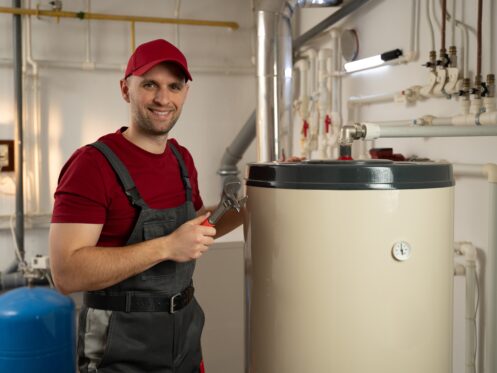Water heaters play a crucial role in maintaining comfort in our homes by providing the hot water we rely on daily. Whether it’s for a soothing shower, washing dishes, or doing laundry, a well-functioning water heater is essential. However, like any home device, water heaters can encounter problems that disrupt their operation. Common issues include a lack of hot water, unusual noises, and even leaks. Addressing these problems effectively and safely is important to ensure your home remains comfortable and your water heater continues to function efficiently.
Identifying Water Heater Problems
Recognizing the signs of water heater problems early can save you from bigger headaches down the road. Here are some common indicators that your water heater might need attention:
- Lack of Hot Water: If your water heater isn’t providing enough hot water or any at all, it could be a sign of a problem.
- Strange Noises: Hearing popping, rumbling, or banging sounds from your water heater might indicate sediment build-up or other issues.
- Leaking Water: Any water pooling around your water heater is a clear sign of a leak, which needs immediate attention.
- Discolored or Smelly Water: Rusty or foul-smelling water can indicate corrosion inside the tank or bacterial growth.
Detecting these issues early is vital. It helps prevent further damage that could lead to more costly repairs or even the need for a complete replacement. Regular inspections and maintenance can aid in catching these problems before they escalate. For more information, visit our Water Heater Maintenance Guide.
Troubleshooting Water Heater Gas Leaks
Water heater gas leaks are a serious concern for any homeowner. A gas leak can be very dangerous, including fire hazards and health issues. Understanding how to identify and address these leaks is crucial for maintaining a safe home environment.
Here’s how you can safely identify a gas leak in your water heater:
- Smell: Natural gas is odorless, but a sulfur-like smell is added for detection. If you notice this smell near your water heater, it could indicate a leak.
- Listen: Hissing sounds near the gas lines or the water heater can signal a gas leak.
- Visual Inspection: Look for any visible signs of damage or corrosion on the gas lines.
For more safety measures, refer to Gas safety tips to ensure you are taking the right steps to protect your home.
Solutions for Gas Water Heater Leaking from Bottom
If you find your gas water heater leaking from the bottom, it can be due to several reasons, such as a faulty drain valve or a corroded tank. Addressing this issue quickly can prevent further damage and costly repairs.
Follow these steps to tackle a bottom leak in your gas water heater:
- Turn Off the Power: For safety, ensure the gas supply to the heater is turned off.
- Inspect the Drain Valve: Check if the drain valve is loose or damaged. Tightening or replacing it might resolve the issue.
- Check for Corrosion: If the tank itself is corroded, it might be time to replace the heater. For cost considerations, see our Water Heater Replacement Cost Tips.
- Flush the Tank: Sediment build-up can cause leaks. Flushing the tank might help, but be cautious and follow proper procedures.
If these steps do not resolve the leak, it may be time to consider professional help. A professional plumber can assess the situation and provide the necessary repairs or replacements.
Improving Energy Efficiency of Your Water Heater
To make your water heater work better not only saves energy but also reduces your utility bills. Here are some straightforward tips to help you achieve better performance:
- Lower the Water Heating Temperature: One of the simplest ways to improve efficiency is by lowering the thermostat setting. Most water heaters are set to 140 degrees Fahrenheit by default, but reducing it to 120 degrees can save energy while still providing comfortable hot water. For a step-by-step guide, visit the Do-It-Yourself Savings Project.
- Insulate Your Water Heater: Adding an insulating blanket to your water heater can reduce heat loss and improve efficiency. This is especially beneficial for older models.
- Perform Regular Maintenance: Regularly flushing your water heater to remove sediment build-up can make it work better and extend its lifespan.
- Consider a Timer: Installing a timer on your water heater can help you schedule heating during off-peak hours, saving energy and money.
When to Call a Professional Plumber
While many water heater issues can be resolved with DIY methods, some situations require professional expertise. Knowing when to call a plumber can prevent further damage and stay safe:
- Persistent Leaks: If your gas water heater is leaking from the bottom and DIY fixes don’t work, it’s time to call a professional.
- Gas Leaks: If you suspect a water heater gas leak, evacuate the area and contact a professional immediately. Gas leaks are hazardous and need expert handling.
- Strange Noises: Unusual noises, such as banging or popping, can indicate serious issues like sediment build-up or a failing heating element.
- Age of the Water Heater: If your water heater is over 10 years old and experiencing frequent problems, a professional can advise whether repair or replacement is best.
To ensure you hire a qualified plumber, consider factors like experience, licensing, and customer reviews. For more guidance, check out Find a Plumber: Hiring, Qualifications, and Costs – This Old House.
Ensuring Long-Term Water Heater Health
Maintaining your water heater is crucial for preventing common issues and ensuring it runs efficiently for years to come. Regular care can help avoid surprise problems and costly repairs. Here are some simple maintenance tips to keep your water heater in top shape:
- Regular Inspections: Schedule regular check-ups to catch any potential problems early. This includes checking for leaks, rust, or any unusual noises.
- Flush the Tank: Over time, sediment can build up in your water heater tank. Flushing it out can help improve efficiency and extend the life of your unit.
- Check the Pressure Relief Valve: Test the pressure relief valve annually to ensure it’s functioning correctly. This valve helps prevent excess pressure, which can lead to leaks or even tank bursts.
- Adjust the Temperature: Set your water heater to a safe and efficient temperature, typically around 120 degrees Fahrenheit, to prevent scalding and save on energy costs.
- Insulate the Heater: Adding insulation to your water heater can help retain heat, improving efficiency and reducing energy consumption.
By following these tips, you can help ensure your water heater operates smoothly and efficiently, providing comfort and reliability for your home.
Ensuring Comfort with Quality Cooling and Heating Services
Addressing water heater problems quickly is essential for maintaining a comfortable and safe home environment. By taking early actions, you can prevent small issues from becoming major headaches. Remember, when in doubt, it’s always best to consult with a professional.
At Quality Cooling and Heating, we are committed to providing reliable HVAC and plumbing solutions to homeowners in the Greater Austin and Abilene areas. Whether you need routine maintenance, emergency repairs, or expert advice, our team is here to help. For more details on our offerings, visit our Services page.
Consider our services to ensure your home’s systems are running smoothly and efficiently. With our professional and community-focused approach, you can trust us to deliver the quality service you deserve.


